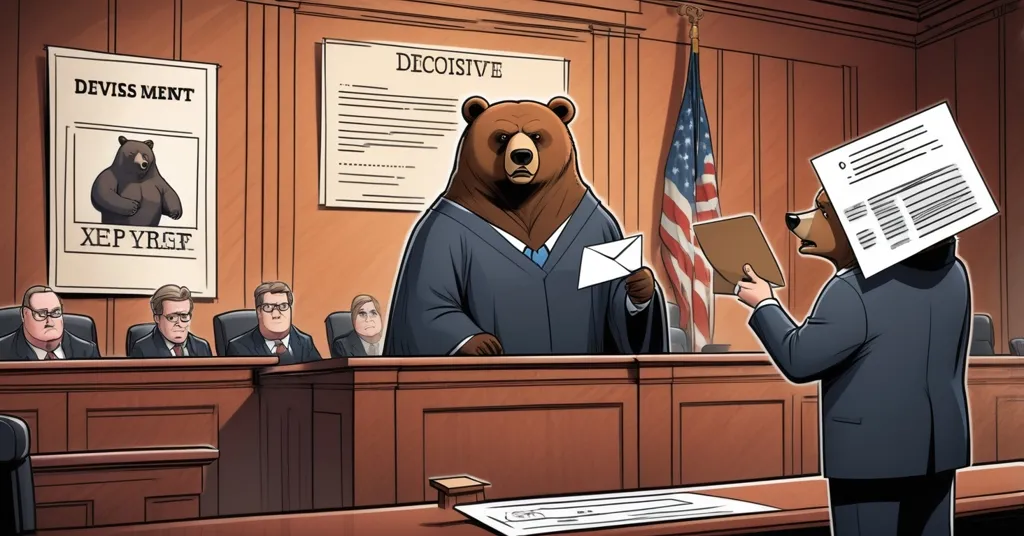Justin W. Keener Files Emergency Letter in SEC vs. Ripple Case, Claims “Decisive Evidence

An Odd Filing Just Graced the SEC vs Ripple Docket, Liberty for the American People
Justin W. Keener, a non-party with a history of SEC penalties, filed an emergency letter in the ongoing SEC vs. Ripple Labs lawsuit, claiming to possess “decisive evidence” that could significantly impact the case. Meanwhile, XRP continues to face a downward trend in its market performance.
- Justin W. Keener files emergency letter in SEC vs. Ripple case.
- Claims to have “decisive evidence” but keeps it secret.
- Previously penalized by SEC for unregistered penny stock dealings.
- Argues SEC’s $2 billion penalty against Ripple is excessive.
- XRP price struggles, showing downward trend.
On April 2, Keener’s emergency letter landed on Judge Analisa Torres’ desk, urging her to consider evidence that he believes could help resolve the SEC vs. Ripple Labs case. The term “decisive evidence” refers to information that could significantly impact the outcome of a legal case, but Keener remains tight-lipped about its nature. This move by a man previously ordered by the SEC to pay over $10 million for unregistered penny stock dealings adds an intriguing layer to the ongoing legal drama.
Keener doesn’t just hint at evidence; he criticizes the SEC’s proposed $2 billion penalty against Ripple, calling it “excessive and unfair.” He compares it to past SEC settlements with companies like Block.one, Telegram, Kik, and Genesis, which faced lower penalties despite raising more capital. Keener argues that the penalty might violate Supreme Court guidelines on civil penalties, which are meant to be remedial, not punitive. XRP, the cryptocurrency associated with Ripple, is currently trading at $2.05, down 1.2% in the last 24 hours, with technical indicators, tools used to predict future price movements, showing a bearish trend.
Keener’s letter isn’t solely about Ripple but takes a broader swipe at the SEC’s regulatory tactics, questioning their fairness and potential to stifle American innovation. Ripple isn’t accused of fraud or misrepresentation, a fact Keener emphasizes, suggesting that the SEC’s penalty appears designed to punish rather than remedy.
“Ripple has represented that it ceased making institutional sales of XRP in the United States after the SEC filed suit. These facts make clear that any violation was limited in scope and duration, and there is no ongoing violation of the securities laws. Importantly, the SEC has never alleged fraud or misrepresentation by Ripple.”
“Given the absence of fraud and the limited violation scope, a $2 billion penalty appears designed to punish rather than remedy. This may violate the Supreme Court’s stance on civil penalties, which must remain remedial in nature.”
Keener’s past with the SEC, where he was no stranger to penalties himself, adds a dash of irony to his current involvement. It’s like watching a former penalty box regular argue against the referees. But beyond the irony, his filing touches on critical issues about regulatory fairness and the impact of SEC actions on the crypto industry.
The SEC vs. Ripple case has far-reaching implications for XRP’s market performance. The ongoing legal battle has contributed to XRP’s price struggles, reflecting the market’s sensitivity to regulatory uncertainty. As the crypto world watches, one can’t help but wonder if Keener’s gambit will ripple through the halls of justice or sink without a trace.
In the spirit of decentralization and freedom, it’s important to recognize that while Bitcoin maximalists might dismiss XRP, the broader crypto ecosystem thrives on diversity. Altcoins and other blockchains, like Ethereum, play crucial roles in the financial revolution, filling niches that Bitcoin might not. This variety fuels the fire of effective accelerationism (e/acc), pushing the boundaries of what’s possible in decentralized tech.
Recent political and leadership changes at the SEC, with Mark Uyeda as Acting Chairman and Paul Atkins nominated for the permanent position, could influence the SEC’s future approach to crypto regulation. The formation of a Crypto Task Force led by Commissioner Hester Peirce also suggests a potential shift toward a more transparent regulatory framework for digital assets. This could have a significant impact on the Ripple case and other ongoing lawsuits against crypto firms.
The SEC’s appeal of the July 2023 ruling, which stated that XRP itself is not a security but institutional sales were unregistered securities offerings, indicates their determination to challenge the current decision. Discussions about potential regulatory changes, including a potential case drop, further highlight the fluid nature of the legal landscape surrounding cryptocurrencies.
Key Takeaways and Questions
- What is the nature of the “decisive evidence” Justin Keener claims to have?
Keener’s “decisive evidence” remains unspecified, leaving it open to speculation and possibly part of his broader strategy to influence the case.
- Why might Justin Keener’s filing be considered self-serving?
Keener’s past legal issues with the SEC and his attempt to influence the Ripple case could be seen as an effort to rehabilitate his public image or mitigate his own legal troubles.
- How does Keener argue that the SEC’s proposed penalty against Ripple is unfair?
Keener argues that the penalty is excessive given the limited scope and duration of Ripple’s violation, the absence of fraud, and the comparison to lower penalties in similar past cases.
- What impact does the SEC vs. Ripple case have on XRP’s market performance?
The ongoing legal battle has contributed to XRP’s price struggles, with technical indicators showing a downward trend and a lack of positive price action.
- What broader issues does Keener’s filing touch upon regarding regulatory actions?
The filing raises questions about regulatory fairness, the potential stifling of innovation by excessive penalties, and the remedial nature of civil penalties as per Supreme Court guidelines.
- How does the case reflect on the broader crypto ecosystem?
The case highlights the importance of regulatory clarity for all cryptocurrencies, not just XRP, and underscores the value of diversity in the crypto ecosystem.



